
CETA Scholarship Winners 2019–2020
By Diane M. Calabrese / Published October 2019
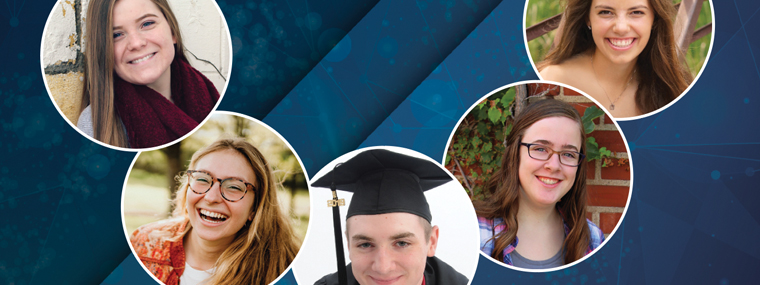
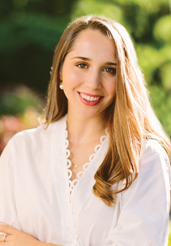 Kate Evans
Kate Evans
(Sponsor—Evans Equipment & Environmental)
A member of the Auburn University class of 2023, Kate Evans is confident she has found a great setting. “Not only was I enticed by Auburn’s phenomenal staff, but I also found what I was looking for in a college campus,” she says.
“Auburn, AL, is a very small college town with 64,000 residents,” explains Evans. “When looking for colleges, I knew I wanted an SEC [Southeastern Conference] school, but I was not interested in a very large city.”
 Evans says she is “extremely excited” to begin her freshman year at Auburn. “I know it is exactly where I am supposed to be to accomplish my dreams. I believe Auburn will allow me to develop not only intellectually but also socially.”
Evans says she is “extremely excited” to begin her freshman year at Auburn. “I know it is exactly where I am supposed to be to accomplish my dreams. I believe Auburn will allow me to develop not only intellectually but also socially.”
 Thomas Friedrich
Thomas Friedrich
(Sponsor—Alkota Cleaning Systems Inc.)
Beginning his freshman year at Gordon College, Thomas Friedrich will be pursuing a major in linguistics. He discovered his affinity for the subject while living in Indonesia.
“Last summer, I received a scholarship from the National Security Language Initiative for Youth—NSLI-Y—to live as an exchange student in Jakarta, Indonesia,” explains Friedrich. The immersion in a different culture made him realize he wanted to become a student of languages.
 “Because of my time studying Indonesian in Jakarta and because of taking French classes in high school, I realized my love of languages and my desire to continue studying them,” says Friedrich. “My decision to look into Gordon College was significantly influenced by their linguistics program.”
“Because of my time studying Indonesian in Jakarta and because of taking French classes in high school, I realized my love of languages and my desire to continue studying them,” says Friedrich. “My decision to look into Gordon College was significantly influenced by their linguistics program.”
 Alyssa Hanson
Alyssa Hanson
(Sponsor—Cat Pumps)
The University of Wisconsin–La Crosse is where Alyssa Hanson begins her freshman year. “I will be studying early to middle childhood education, with plans to teach in an elementary school in the future,” she explains.
Hanson says she discovered her interest in becoming an educator of young children through a combination of experiences. She worked a summer job at a local park and recreation department where she ran summer camps for children. “I also went on yearly mission trips with my church in which our service projects often involved helping clubs for underserved children.”
 The opportunities that Hanson’s university offers to take major-specific courses during freshman year and to get into local classrooms and teach persuaded her the institution is the right one for her. “I fell in love with it the moment I stepped onto campus,” she says.
The opportunities that Hanson’s university offers to take major-specific courses during freshman year and to get into local classrooms and teach persuaded her the institution is the right one for her. “I fell in love with it the moment I stepped onto campus,” she says.
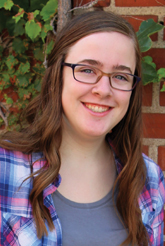 Emma Hoefer
Emma Hoefer
(Sponsor—MI-T-M Corporation)
Among all the science classes she enjoyed in high school, Emma Hoefer says chemistry really got her attention. “It wasn’t until I took a chemistry course that I found something I really loved.”
A freshman at Loras College, Hoefer looks forward to earning a degree in chemistry. “Whether it be working in education, pharmaceuticals, the medical field, or forensics, I know I will be able to put my degree to good use and have a positive impact on those around me,” she explains.
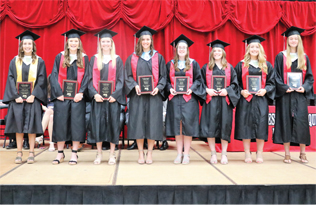 Hoefer also welcomes the opportunity she will have during her student years to be engaged in her community. “I’ve always liked doing volunteer work, and Loras has many projects that benefit the local community.”
Hoefer also welcomes the opportunity she will have during her student years to be engaged in her community. “I’ve always liked doing volunteer work, and Loras has many projects that benefit the local community.”
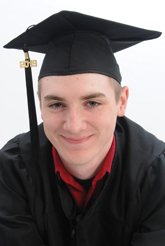
 Donovan Huff
Donovan Huff
(Sponsor—Chappell Supply and Equipment)
Looking forward to a career as an engineer, Donovan Huff is attending the University of Oklahoma. He says he settled on his course of study after competing in the 2019 FIRST Robotics Competition, which had a “profound impact” on him.
“The competition truly challenged me and my team to innovate and solve problems on the spot, something that is the epitome of engineering,” says Huff. “The experience of building a machine under pressure and seeing it complete its challenge has left me more convinced than ever that my place is in engineering.”
Letter of Thanks From Former CETA Scholarship Winner—Kyle Hardaway
The CETA scholarship was crucial in reducing my financial burden during my undergraduate studies. My student loan debt was a more considerable source of anxiety than my classes, and thanks to the scholarship I was less distracted by debt and able to focus more on my studies.
The scholarships from CETA allowed me to concentrate on my biology classes as I prepared for medical school. While I knew I wanted to serve in the military, if I had accepted a military scholarship during my undergraduate years, I would have most likely been unable to attend medical school due to my service obligation. However, accepting the CETA scholarships allowed me to begin my military career after I was already accepted into medical school, ensuring the fulfillment of two lifelong dreams.
Now, one year into medical school and serving in the Navy, my plan after graduation is to serve as an Undersea Medical Officer (UMO), working with divers and submariners. Afterward, I will seek a residency with the Navy in some type of surgical field (I’m leaving my options open for now).
 Sarah Kelley
Sarah Kelley
(Sponsor—Ko Manufacturing Inc.)
A sophomore at the University of Missouri, Sarah Kelley looks forward to a job as a speech pathologist. “I chose speech pathology as my future job because it combines my love of language and medicine and, more importantly, improves the world,” she says.
Kelley explains that she has a “passion for linguistics and etymology” that led her to her course of study. “I hope to help children struggling with speech or developmental disorders to increase their language and communicative abilities,” she says.
 “I also have a special interest in developing the pronunciation skills of second-language learners,” says Kelley. “In an increasingly globalized society, it is important that we learn second languages—and learn them well.”
“I also have a special interest in developing the pronunciation skills of second-language learners,” says Kelley. “In an increasingly globalized society, it is important that we learn second languages—and learn them well.”
 Joy Nelms
Joy Nelms
(Sponsor—Action Cleaning Systems Inc.)
It’s always wonderful to have two good choices, even when we can only make one selection. “I was deciding between Texas A&M and Biola in California, but in the end, I chose Texas A&M,” says Joy Nelms.
“Biola is a small, private Christian school of only 5,000 students,” explains Nelms. But she was swayed by having a very good choice that was closer to home. “I decided I wanted the big football games and excited attitudes, and A&M’s academic reputation is great for future jobs and careers.”
 Nelms adds that by choosing an institution in the Lone Star State instead of the Golden State, she will be just a three-hour drive from home (as opposed to a 22-hour drive). That’s a nice bonus. “I can come home for a long weekend and hang out with my family,” she explains.
Nelms adds that by choosing an institution in the Lone Star State instead of the Golden State, she will be just a three-hour drive from home (as opposed to a 22-hour drive). That’s a nice bonus. “I can come home for a long weekend and hang out with my family,” she explains.
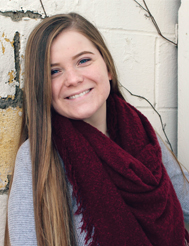 Ashlee Never
Ashlee Never
(Sponsor—Allspray Inc.)
A class in psychology and experience as a camp counselor to sixth grade students were two of the factors that persuaded Ashlee Never to choose social work/school counseling as a major. She will be studying at the University of Toledo.
Being a counselor provided good experience in the art of patience and the importance of navigating difficult situations, explains Never. She plans to tap that experience and her future studies in order to “help people help themselves.”
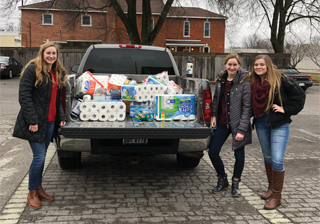 Pragmatic as she is excited about the future, Never fully considered the economics of her choice of institution. “I was motivated to choose the University of Toledo because it is the most cost-efficient option for me, and I will easily be able to commute every day,” she says. “Not to mention, the campus is beautiful, and the people are amazing.”
Pragmatic as she is excited about the future, Never fully considered the economics of her choice of institution. “I was motivated to choose the University of Toledo because it is the most cost-efficient option for me, and I will easily be able to commute every day,” she says. “Not to mention, the campus is beautiful, and the people are amazing.”
Never wants readers to know that one year ago college did not seem to be an option for her. With the CETA Scholar-ship, it is. She says she is “very thankful for this opportunity”—a sentiment that other scholars share and express to us in many ways.
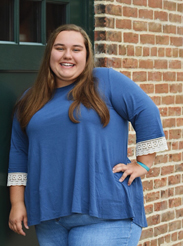 Lydia Wehrspann
Lydia Wehrspann
(Sponsor—MI-T-M Corporation)
The deep admiration she developed for the medical professionals that saw her grandmother through a terminal illness motivated Lydia Wehrspann to study nursing at St. Catherine University in St. Paul, MN. She looks forward to becoming an oncology nurse.
“Going to St. Catherine will help me fulfill this goal because they do clinical work at the best medical institutions in Minnesota,” says Wehrspann of her plans to pursue a career in nursing. “In the end, my goal would be to improve patient and caregiver experiences.”
 Wehrspann explains that while she takes her studies seriously, she aims for a rounded life, including pursuits for fun. “I’m not all about my schoolwork. I am also dedicated to helping others and living life to the fullest, which includes collecting more than 20 pairs of crocs.”
Wehrspann explains that while she takes her studies seriously, she aims for a rounded life, including pursuits for fun. “I’m not all about my schoolwork. I am also dedicated to helping others and living life to the fullest, which includes collecting more than 20 pairs of crocs.”
CETA Scholarship Logistics
An independently incorporated charitable organization, the CETA Education Foundation raises funds for scholarship awards. It was established in 1996.
Eligibility to apply for a CETA Scholarship extends to families of CETA members and to CETA member’s employees and families. Each applicant must be sponsored by a CETA member manufacturer, supplier, or distributor.
To the fullest extent possible, the competitive scholarships are apportioned equally among the three CETA membership groups of manufacturer, supplier, and distributor. (At-large scholarships are awarded if there is not a qualifying applicant in a group.)
The 2019–2020 manufacturer category awardees are Lydia Wehrspann, Emma Hoefer, and Thomas Friedrich; supplier category awardees are Sarah Kelley, Alyssa Hanson, and Donovan Huff; distributor category awardees are Ashlee Never, Kate Evans, and Joy Nelms.
Contributions from Lease Consultants Corporation, Royce Industries L.C., Cleaner Times magazine, Alkota Cleaning Systems Inc., Women of CETA, Chappell Supply and Equipment, A.R. North America Inc., Etowah Chemical Sales and Service, and Farley’s Inc. made possible the awards to the CETA Scholars 2019–2020.
“We are always looking for donations to build the scholarship fund,” says Roy G. Chappell, CEO of Chappell Supply and Equipment in Oklahoma City, OK, and a trustee of the CETA Education Foundation. Scholarships can be named for companies and foundation trustees can provide more information about the how of naming.
For more about the CETA Education Foundation and the application process for a CETA Scholarship, visit www.ceta.org and pull down the ‘Foundation’ tab.





